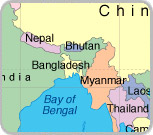Monitoring and Evaluation
|
>> Amader Gram - Measuring the impact of ICTs for development
BFES provides advice and support to local communities in Rampal, Bagerhat to help them harness the potential of Information and Communication Technologies (ICTs). While the tangible results through projects, networks and training programs are promising, five key questions remain:
• How far have local people been empowered?
• Are they more aware of the possibilities of ICT?
• Did users gain economically?
• Was there any impact at the level of the organization or the sector? and,
• Did the project catalyze other projects?
To answer these questions, BFES has developed a continuous, participatory, and self-reflecting, Monitoring and Evaluation (M&E) system for its Rampal Programs.
When BFES started empowering people through ICT-enabled development in 1998, ICT was still a relatively new and unknown tool for development, particularly where poverty alleviation and rural access are concerned. Consequently, a sound Monitoring and Evaluation (M&E) system had to be developed to measure the project satisfaction and development impact of BFES's Programs in Rampal. A distinction is made between the five areas of awareness, empowerment, economical impact, organizational and sectoral impact, and catalytic effect. Furthermore, i n order to demonstrate BFES's effectiveness , feedback from project partners (schools) was needed to determine how satisfied they were with the support provided by BFES.
Based on the needs outlined above, BFES developed a tailor-made Monitoring and Evaluation system in 2000. It involved identifying an M&E partner school in each focal center to collect and analyze qualitative and quantitative data through questionnaires and Focus Group Meetings and to capture the lessons learned in evaluation reports. Q uestionnaires make it easy to gather data in a simple and straightforward manner and compare projects and activities. The questionnaires were developed and subsequently tested on projects in Rampal and then developed further to form the basis of the permanent M&E system that is used today. Focus Group Meetings are a tried-and-tested instrument to gather qualitative data from a selected group and provide a learning environment based on trust.

